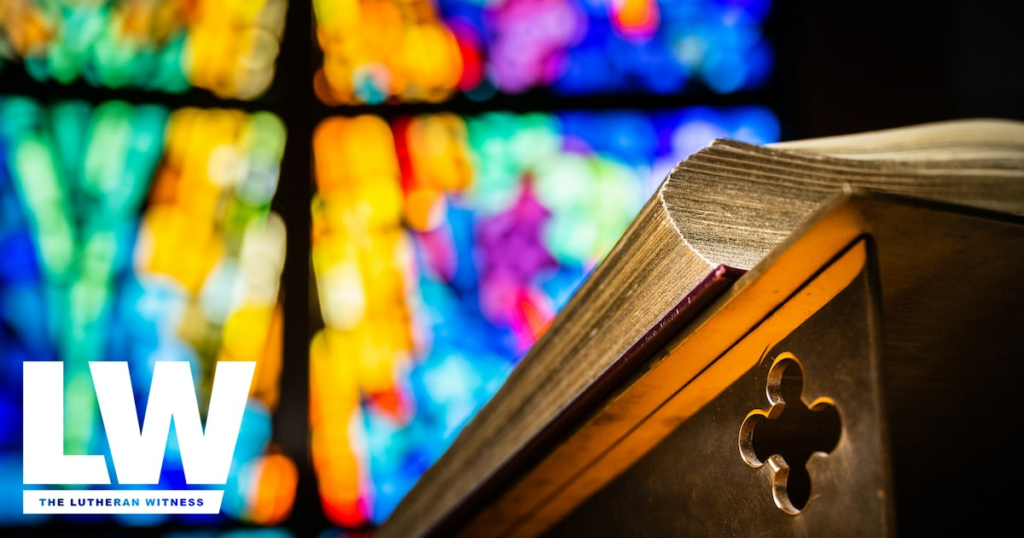by Jeni Miller
“For the very fact that the sword has been instituted of God to punish the evil and protect the good and preserve peace, (Romans 13:1, 1 Peter 3:1) is proof, powerful and sufficient, that fighting and slaying and the other things that war-times and martial law bring with them, have been instituted by God. What else is war than the punishment of wrong and evil?” (Martin Luther, Whether Soldiers Too Can Be Saved)
LCMS member Colonel Bud Day understands the office of the sword, the punishment of wrong and evil and what it means to suffer for the good of his neighbor. A retired U.S. Air Force Colonel and Command Pilot, Day served during World War II, the Korean War and the Vietnam War, including five years and seven months as a Prisoner of War in North Vietnam. During that time of being captured, escaping and living on frogs and berries to survive, then being recaptured and tortured, Colonel Day remained steadfast in faith in God and in service to his country.
Colonel Day is the most decorated U.S. military service member since General Douglas MacArthur, receiving more than seventy decorations, and he is also a recipient of the Medal of Honor and the Air Force Cross. Following his retirement from the military, he resumed work as a lawyer in Florida, where he currently attends Good Shepherd Lutheran Church, Shalimar, Fla.
The following is an edited Lutheran Witness (LW) interview with Colonel Day (CD).
LW: Why did you choose to serve in the military?
CD: When I was in high school, just coming up on 17 years old, World War II had started, and we had been attacked by the Japanese. I wanted to defend my country. Although I hadn’t initially planned on a military career, I couldn’t see doing anything other than that until the war was over. Due to my service, I earned four years of college eligibility, enough for a degree or a couple of degrees, so I decided to either become a doctor or a lawyer-so I became a lawyer.
LW: It would be impossible to recount here what you went through during your military career. In the midst of war, imprisonment, torture and death, how were you able to remain so courageous?
CD: I have been very frightened many times. I don’t make any excuses or apologies for that. However, I experienced that there was physically a calm that God gave me in the midst of trouble. One thing I always insisted on was to stay within the legal limits of things you can do in warfare and never exceed those. To the best of my knowledge, I never exceeded those limits. I have killed a lot of people, but I never acted outside of what I was called to do. Being a soldier is not easy, but I was able to remain courageous because I knew that I was involved in defeating a lot of evil for the good of my neighbor.
Sometimes I had so many prayers, I was convinced others probably couldn’t get their prayers in edgewise because I had so many lined up! I also used to say Psalm 23 everyday.
LW: When in Vietnam, your plane was shot down. Was this a time of faith building or faith questioning?
CD: I never questioned my faith. It never faltered. No matter what our enemies tried to tell me or what I heard on the radio, God never allowed me to believe them or question my faith.
LW: How does your Lutheran faith impact your work and life, both past and present?
CD: I believe that your faith is a big part of your persona. It dictates how you conduct yourself and how you live, the stand you take on certain issues. I’ve always held onto the outlook that God runs the universe and has a plan for all of us. Everything that happened to me-and that continues to happen to me-is a part of God’s perfect will.
LW: It is difficult for many people, especially civilians, to see being a lifelong soldier who has and is willing to go into combat as a God-given vocation. How do you see your service in the Armed Forces as a vocation given by God?
CD: Freedom is not free. We even acknowledge that in the hymns that we sing in church, like Onward Christian Soldiers, as we recognize that there is always a war raging and that all people should be treated fair and equally. Sometimes people are given the vocation to fight to protect that, which is why I see no conflict in being a Christian and being in combat at all.
LW: How can we in the LCMS who are not engaged in military service best serve and help our brothers and sisters who risk their lives for our protection?
CD: We not only need to believe in Christ, but we also need to be diligent in acting out our beliefs. The best way to help those in the military is by prayer and keeping the faith.
—
About the author: Jeni Miller (jenikaiser@aol.com) is an editor-at-large for The Lutheran Witness.
August 2012





